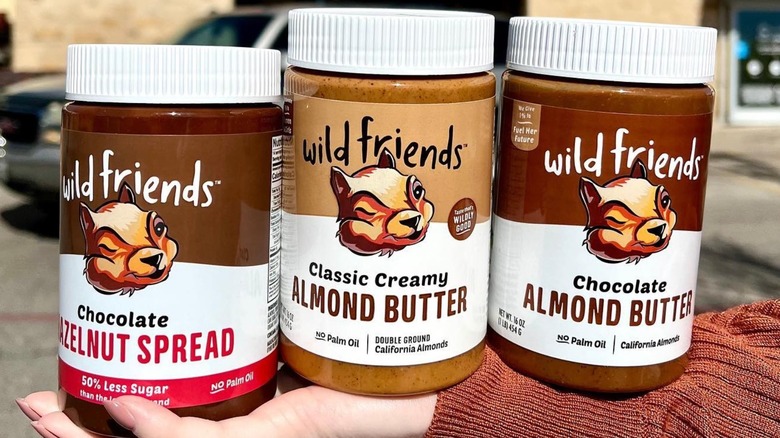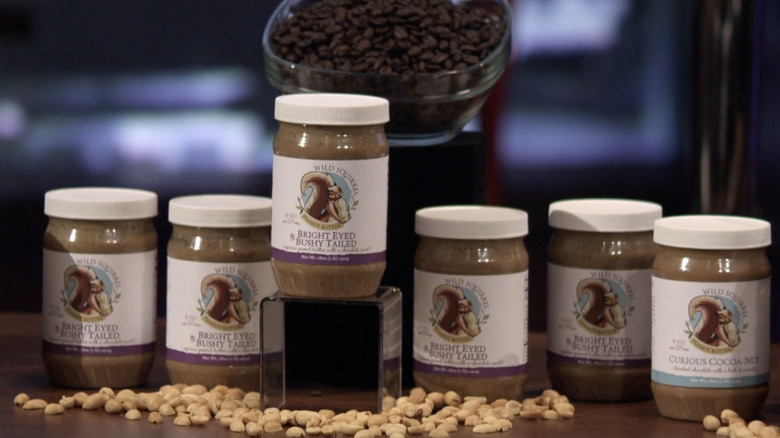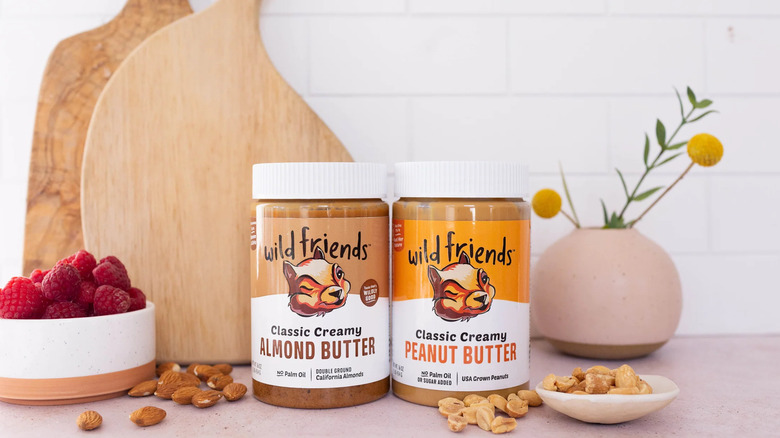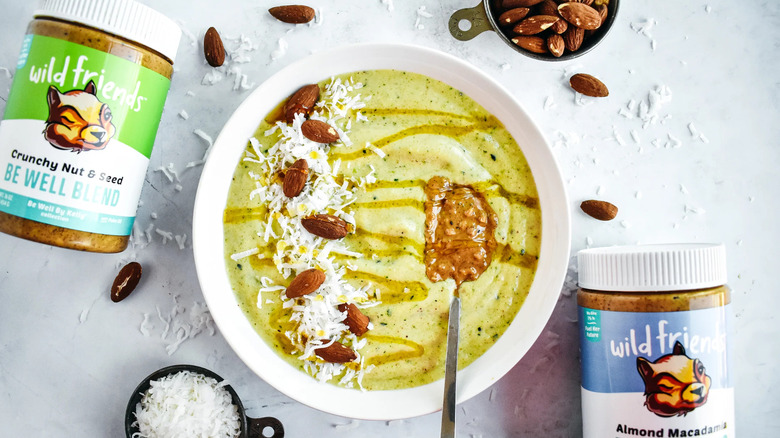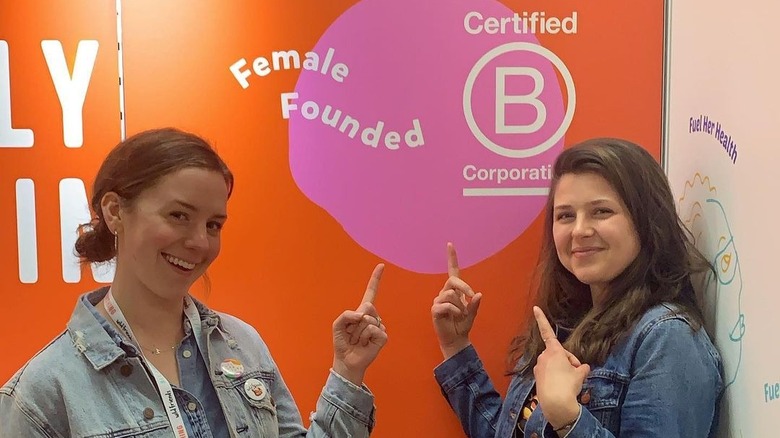What Happened To Wild Squirrel Nut Butter After Shark Tank?
College sophomores and self-professed peanut butter lovers Erika Welsh and Keeley Tillotson began experimenting with their food processor and a bag of peanuts in their dorm room after running out of the premade stuff. After trying out new combinations for their own pleasure, they decided to try and market their peanut butter to the public. Entrepreneurship wasn't something either of them had gone to school for, with the two of them joking that this venture was their "honorary business major." However, with $50,000 from their parents, they were able to launch the business and make some modest earnings through farmers' market sales and direct-to-consumer online shipping — but they needed more money in order to make the move to brick-and-mortar grocery stores, so they took their company Wild Friends (called "Wild Squirrel" at the time) to "Shark Tank."
Airing in 2012 as part of Season 3, Episode 14, the two started their pitch in the episode by telling their story and allowing the Sharks to try a few of their peanut butter flavors, which included chocolate espresso, cinnamon raisin, chocolate coconut, and honey pretzel. The Sharks were overwhelmingly pleased with the taste of the peanut butter but with the duo asking for $50,000 for just a 10% stake in the young company, they weren't totally convinced this was a viable business opportunity.
What happened to Wild Squirrel on Shark Tank?
After the Sharks drilled down on the details, it became apparent that the young entrepreneurs were not turning a large enough profit, as they were only making $1 per jar at the time. Kevin O'Leary said they needed to make a minimum of $3 per jar in order for him to consider, and remarked that the pair were significantly over-valuing the new company. At one point, Robert Herjavec seems flabbergasted as co-founder Keeley Tillotson says that their company was valued so highly because they deserve it, saying that you can't value a company based on what you deserve. He announced he was out, as were Daymond John and Mark Cuban, who also expressed doubts that the two could reliably balance the responsibilities of business ownership and going to college full-time.
Barbara Corcoran, however, was interested in the concept and offered a deal; she told Welsh and Tillotson that she'd give them the $50,000 but for 40% instead of 10%. Her justification was that in the long term, the two would need far more than $50,000, and the 10% stake to make the company successful was not worth it. Despite an attempt at a counteroffer, the women ultimately went for the 40% equity deal with Corcoran.
Wild Squirrel After Shark Tank
Despite accepting the deal on air, it was revealed that the nut butter-making duo's deal with Barbara Corcoran did not go forward. "On their end, they decided not to invest, and we were glad because we were not ready," Keeley Tillotson said in an interview with Forbes. This detail is not mentioned in an update on the company on Season 4, Episode 12 of "Shark Tank," which aired in 2013. The two do reveal that after appearing on the show, it became clear they could not maintain their college careers and run their peanut butter business, so they both dropped out. Tillotson called the choice "the best decision they ever made."
Despite Corcoran's deal falling through, the company still did incredibly well after their appearance on the show. In the update segment, the two reveal that they had just $16,000 in revenue before "Shark Tank," and have now sold over $350,000 worth of peanut butter in under a year. The company founders also took to CircleUp to find a lead investor and raise additional funding. John Foraker, CEO of Annie's, decided to invest in the company, which led to an additional $1.4 million in backing. Since then, the company raised an additional $3.5 million and brought on former General Mills executive Beth Hanson as VP of sales. That isn't the only seasoned executive working with the company: Its investors include Eduardo Castro-Wright and Duncan Niederauer, former executives at Walmart and the New York Stock Exchange, respectively.
Is Wild Squirrel still in business?
This peanut butter company is alive and well, but no longer goes by Wild Squirrel. The company was hit with a lawsuit by a Texas-based brand called Squirrel Brand Co., which also sold nut butters on the basis of copyright infringement. The lawsuit prompted Wild Squirrel to change its name, making the shift to Wild Friends Nut Butter instead. The label's signature squirrel remains a part of the company's branding still, just with a little makeover.
To keep on trend with changing tastes, the company has also expanded its offerings from peanut butter to various other nut butters, such as sunflower and almond butter, as well as chocolate hazelnut spreads, nut and seed combo spreads, and cashew-blended "super butters." Perhaps surprisingly, it dropped the quirky pretzel and espresso flavor combos and now offers more basic nut butters with fewer ingredients.
As of 2021, Wild Friends brought in $14 million in annual revenue and is now available at Whole Foods, Costco, Walmart, and Kroger, as well as a number of other grocery stores. It also continues to offer direct-to-consumer online sales, and online reviews for the products are generally positive.
What's next for Wild Friends?
Since appearing on "Shark Tank" over 10 years ago, a lot has changed for Wild Squirrel, and that goes far beyond the name. The brand now more strongly identifies as a clean-eating brand, with its website's "About" page saying, "We promise to always make our products with short lists of clean ingredients, excluding palm oil, excess sugar, and artificial anything." It also stresses the importance of being an ethically run company, taking care to note that it is a B-Corp, a classification of company that is held to stringent standards of social and environmental responsibility.
While the founders and investors haven't spoken publicly about what they see for the future of Wild Friends, given its greater emphasis on health-conscious, ethically-sourced ingredient lists and social responsibility, it seems likely that Wild Friends Nut Butters will continue to expand their product offerings, potentially focusing on localizing their ingredients and business operations. Additionally, they mention that the company has taken on its first nonprofit partner with Girls Inc., which implies that there may be future opportunities for additional nonprofit partners.
